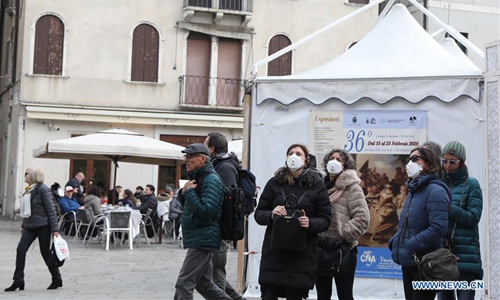HOME >> WORLD
Italy's government looking into price gouging for items connected to coronavirus
Source:Xinhua Published: 2020/2/26 7:44:50

Tourists wearing masks are seen in Venice, Italy, Feb. 23, 2020. A total of 152 people have tested positive for COVID-19 in Italy, including three deaths and one recovery, said Angelo Borrelli, head of the country's civil protection department, on Sunday. The total includes 110 cases in the northern region of Lombardy, 21 in the northeastern region of Veneto, and nine in the northern region of Emilia-Romagna, Borrelli said at a televised press conference, adding that an Italian researcher has made a full recovery. (Xinhua/Cheng Tingting)
Italy's Ministry of Economy said Tuesday it was looking into cases of possible price gouging on items being used to protect citizens against the spread of the novel coronavirus.
In recent days there has been a spike in the number of Italians suffering from the virus, which is formally known as COVID-19. As of late Tuesday local time, the number of people confirmed as infected with the virus in Italy was 322, and mostly in the northern part of the country, and 10 people died of the virus.
Since the dramatic rise in infections that started on Feb. 21, prices for disinfectants and masks that are thought to be essential to prevent infections have increased, sometimes ten-fold or far more. The increases sparked dozens of complaints to consumer advocacy groups and to government agencies, according to local news reports.
According to news report from Tuesday's "Italia Today" , paper surgical masks that were originally sold at the rate of two for 1 euro (1.10 U.S. dollars) were offered for sale in Milan for a price of 70 euros (76 U.S. dollars) for three.
Local media Il Messaggero said that stores have run out of these objects and that the few that still have them in stock "have increased prices ... indiscriminately."
Lombardy, the region that includes Milan, has reported more than 200 cases of coronavirus, around 80 percent of the total cases in Italy as a whole.
On Tuesday, Deputy Minister of Economy Laura Castelli said the government was looking into whether to use emergency powers granted Jan. 31 to fix prices for such products for the duration of the health crisis.
"We are examining prices ... to avoid unjustified increases," Castelli said in a radio interview. Castelli said the country's financial police were already investigating what she called "anomalous price increases."
Castelli herself reported seeing some items for sale for hundreds of euros, though she did not specify which items.
"This is not the case of a free market, this is a case of shameful speculation that must be halted immediately," she said. Enditem
RELATED ARTICLES:
Posted in: EUROPE